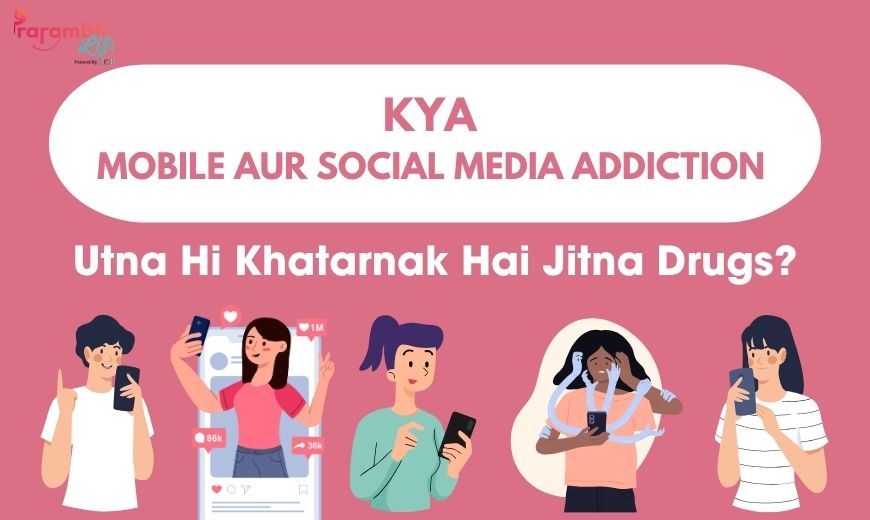
Ask anyone about addiction, and most people think of cigarettes, alcohol, or drugs.
But scroll down your phone for “just 5 minutes,” and an hour slips by. You check your phone the moment you wake up and before you sleep. You panic if it’s not in your hand.
Sounds harmless?
That’s exactly how it begins.
The truth is, mobile and social media addiction can be just as dangerous as substance addiction not always physically, but mentally and emotionally.
Addiction Is Not About the Substance — It’s About the Brain
Whether it’s a cigarette, alcohol, or Instagram — the brain doesn’t care what gives it pleasure. It only cares about dopamine — the “feel-good” chemical that rewards you whenever you experience something enjoyable.
Every notification, every like, every video releases a tiny dose of dopamine.
The more you scroll, the more your brain craves it.
And slowly, the habit becomes a compulsion — a need, not a choice.
In other words:
Digital addiction is not about the phone in your hand. It’s about the control it has over your mind.
The Silent Symptoms We Ignore
Unlike drug addiction, mobile and social media dependency rarely looks dramatic — but its impact runs deep.
Here’s how it shows up:
- You reach for your phone unconsciously, even during conversations.
- You feel anxious, restless, or “empty” without it.
- You lose track of time scrolling — even when you know you shouldn’t.
- You compare yourself constantly, feel low after social media use.
- Sleep, focus, and real relationships start deteriorating.
It doesn’t hit suddenly — it seeps in quietly.
And the worst part? Society rewards it. We call it being “connected,” “updated,” or “productive.”
But in truth, constant stimulation rewires the brain exactly like a drug would — by hijacking your reward system.
How Mobile Addiction Mirrors Substance Abuse
Let’s break it down:
| Addiction Type | Trigger | Reward | Consequence |
|---|---|---|---|
| Drugs / Alcohol | Stress, peer influence, escape | Euphoria, numbness | Physical & psychological dependence |
| Social Media / Mobile | Boredom, loneliness, FOMO | Dopamine hits from likes & engagement | Anxiety, sleep deprivation, emotional fatigue |
In both cases, the brain follows the same loop:
Cue → Craving → Indulgence → Guilt → Repeat.
It’s not about what you consume — it’s about how much control it consumes from you.
The Emotional Fallout
Studies have shown that heavy digital users experience:
- Reduced attention span and memory
- Increased anxiety and restlessness
- Depression linked to comparison and social validation
- Disturbed sleep cycles from blue light and overstimulation
- Loss of emotional presence — even with people physically around
In essence, we are raising a generation that feels “connected” online but disconnected within.
Breaking the Digital Addiction Loop
The good news?
Digital addiction, unlike substance abuse, can often be reversed early — with awareness, structure, and support.
Here’s how to start:
- Digital Detox Windows: Set no-phone hours (especially during meals and before bed).
- Limit Dopamine Triggers: Turn off notifications or keep social media off your home screen.
- Replace, Don’t Remove: Swap doomscrolling with activities that restore — reading, walking, meditation.
- Track Screen Time: Awareness is the first step toward control.
- Seek Guidance: If anxiety, sleep loss, or emotional exhaustion persist, professional help is key.
And that’s exactly where Prarambh Life steps in.
How Prarambh Life Helps You Regain Balance
At Prarambh Life, we understand that digital addiction isn’t a discipline issue — it’s an emotional coping issue.
That’s why our programs are designed not to punish, but to retrain your relationship with technology and rebuild focus, calm, and control.
The 3-Month Program: Awareness & Reset
Perfect for those noticing early signs of tech burnout.
It focuses on:
- AI-powered stress tracking (Streffie) to identify triggers.
- Mindful screen management tools.
- Journaling & reflection modules through My Diary.
- Grounding exercises to reduce digital overstimulation.
The 6-Month Program: Deep Digital Detox & Lifestyle Redesign
For individuals whose daily life or mental health is deeply impacted by screen dependency.
It offers:
- Personalized coping frameworks for long-term digital balance.
- Therapeutic guidance for emotional regulation.
- Relapse prevention using data-driven behavioral insights.
- Community support for accountability and shared growth.
Both programs are completely digital-first, culturally sensitive, and guided by human empathy — making healing accessible without judgment.
The Real Question Isn’t “How Dangerous?” — It’s “How Controlled?”
Mobile or social media addiction may not damage your liver or lungs, but it rewires your mind, numbs your emotions, and distorts your sense of time and self — which can be just as dangerous.
Because when the virtual world starts controlling your real emotions, it’s no longer just a habit it’s a hold.
At Prarambh Life, we believe recovery isn’t about deleting apps.
It’s about rediscovering balance where technology serves you, not the other way around.

